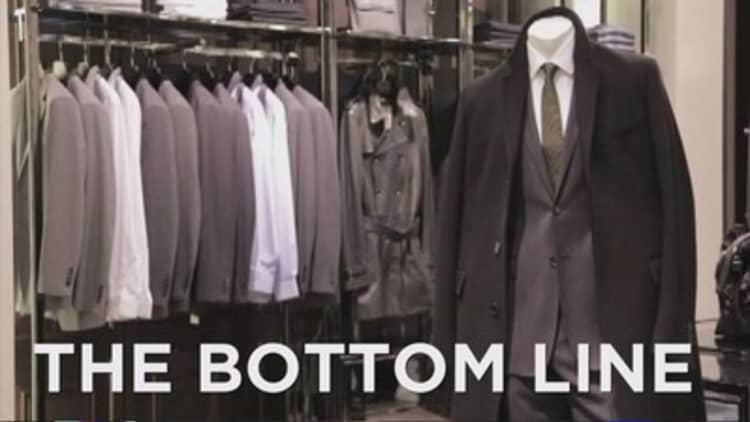



With slowing growth in China rattling international stock markets this year, the luxury goods sector in Europe has seen heavy losses with heightened concerns over weakening demand.
British fashion house, Burberry announced Thursday that its retail revenue had risen 2 percent to £774 million ($1.2 billion) during the first half of its trading year, missing analysts' expectations. The catalysts behind the "disappointing" data? China and Hong Kong.
The world's second largest economy accounts for 30 to 40 percent of the brand's total revenue, but with a surprise devaluation of the yuan this summer and an imposed crackdown on gift-giving, appetite has deteriorated.
The results were "disappointing across the board," Nicla Di Palma, equity analyst at Brewin Dolphin, told CNBC Thursday. Even though sales in China and Hong Kong deteriorated, Palma argued that the Americas showed an "uneven performance" with single-digit growth. She added that while its European operations reported double-digit growth, it was still lower than first-quarter figures.
Burberry's CEO Christopher Bailey, tried to stay optimistic, saying in Thursday's report that, with the holiday season approaching, the company would intensify its focus on driving sales, productivity and its online presence.
Clearly, 2015's been challenging for luxury goods and like other brands, Burberry faces a host of challenges alongside China. Maintaining popularity in their developed markets and handling currency swings are key, but getting to grips with a rapidly transforming consumer culture is also very significant in the luxury market.
"Consumers are becoming far more discerning and are looking for exclusive luxury products and one-off pieces that are original," Fflur Roberts, head of luxury goods at Euromonitor International, told CNBC via email.
"As brand visibility has grown, so brand cachet has diluted. Kering's Gucci has suffered a similar backlash to Burberry following its rapid expansion into China. Consumers are increasingly looking for exclusivity," said Roberts. Analysts have suggested in the past that creating tailored lines for particular countries could help businesses thrive, as luxury consumers want something unique.
On top of that, China's currency devaluations could magnify the luxury price distinction between consumer markets. As prices in China rise, this may prevent them from travelling as far as Europe or buying as much in China.
Instead short-haul destinations like Japan who could "reap the benefits" when it comes to luxury buying, Roberts argues. In Burberry's report, Japan had shown "excellent progress," which suggests China's connection to luxury is still there, but dispersed around the globe.
While Burberry's CEO told CNBC that remaining authentic and giving the best customer service in places like China was imperative; not everyone agrees.
"The macroeconomic challenges are very significant. Burberry being over-represented in China and Hong Kong doesn't help. There is a lot to do with cost-cutting and I'm really not sure management has understood the magnitude of problem," says Brewin Dolphin's Palma.
Palma argued that Burberry's next move should be to close stores, as the volatility doesn't look like a "short term problem."
"Most of consumers are changing their preferences for different brands, potentially more meatier luxury brands like Coach or Tory Burch. Management needs to face these challenges with decisive options which should include closing stores," she said.
—By CNBC's Alexandra Gibbs, follow her on Twitter @AlexGibbsy.




